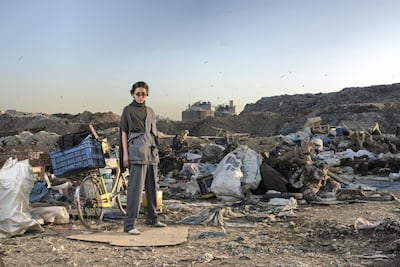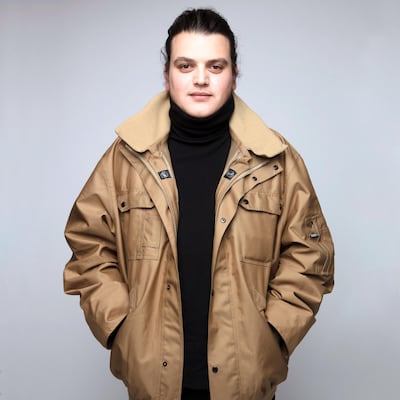Photographing one's fashion collection against the backdrop of a heaving landfill site outside Beirut makes a provocative statement about the way we treat our surroundings. The arresting images might invite repugnance among the buying crowd, but they also provoke thought and dialogue about how much fast fashion ends up being thrown away. This is the message that Lebanese designer and environmental activist Roni Helou, 27, wants to convey.
Before one charges Helou with being part of the problem, know that his collections are created from what are known in the industry as deadstock and what Helou calls “garbage” fabrics. The exquisitely tailored dresses and sportier silhouettes are cut from textiles that Helou’s suppliers in Lebanon gather from factories shutting down in Asia and Europe, and vintage sources. Because supply is short, quantities are limited offering, ironically, some exclusivity to Helou’s designs. “I am happy about that,” he says when we meet during a flying visit to online store MatchesFashion’s London town house. “I want to do things organically, and not plan 500 garments of which 250 end up in landfill in a few years. I like things to happen slowly.”
The luxury retailer is fully supportive of Helou’s mission. “Roni’s connection to sustainability is something that is really important to the customer today, not just within the region but globally, so it really allows his brand to transcend worldwide,” says Natalie Kingham, fashion and buying director of MatchesFashion.
Helou’s aim is to create an activist brand that speaks to people. “We don’t just talk about the clothes, but about the brand’s values and the people I work with as they are important to the story.” Customers want to relate not just to the designer, he says, but to the people behind his brand and the ethical message. “People want to buy into it because they believe in it and they don’t want to feel guilty [about shopping for clothes] anymore.”
Helou, who has shown his spring / summer 2020 and previous collections at Fashion Forward Dubai as part of Starch, a non-profit that helps to launch the careers of emerging Lebanese designers, points out how the sustainability issue is gaining ground in the GCC. "A lot of retailer buyers in Paris are very happy as there are young customers in Dubai and Saudi asking for those sorts of brands. Just like Beirut, Dubai is a fashion hub. Its people are up to date with what's happening in the fashion industry globally, therefore they were very responsive and appreciative to my brand and the values that it carries."
The decision to photograph the autumn / winter 2019 collection on a landfill site is not surprising for this 2016 graduate of Creative Space Beirut (CSB), a free fashion design school, as he has always been a human and animal rights activist and environmentalist. He wanted to highlight the city’s ongoing problem with rubbish disposal. “In our region, people don’t want to listen to negative things; and the problem with [some] Lebanese people is they get fed up and refuse to face the problem. We’ve reached a point where I thought: ‘No, we can’t do that.’”
As a vegan, the designer will exclude silk and wool from his collections; he uses organic fabrics such as cotton and denim, washed gaberdine for soft tailoring, crepon de satin with its fine sheen for oversized jackets and baggy trousers for springwear, and high-quality drapey fabrics for eveningwear. All of it is produced in his country.
"I am proud to produce in Lebanon, but it's tough. We had a good infrastructure for ready-to-wear before the civil war, but we've lost it and it's switched to haute couture, so it is very hard for us ready-to-wear designers to find the expertise now," says Helou, whose clothes are available online from www.csb-shop.com and www.boutiquehubbeirut.com, as well as at AlOthman in Kuwait and the Creative Space Beirut shop.
“Now there are a lot of ready-to-wear designers emerging with the same interest. We are in a country that has been through so much, and everyone realises that we have to do something about it, in whatever way we can. And this is what young fashion designers are doing. This is their voice and they are all creating these brands that are supporting human rights, women’s rights, whatever the cause they believe in. And this is really amazing to see, especially in the Middle East and Arab region, as it’s something we never used to do.”



